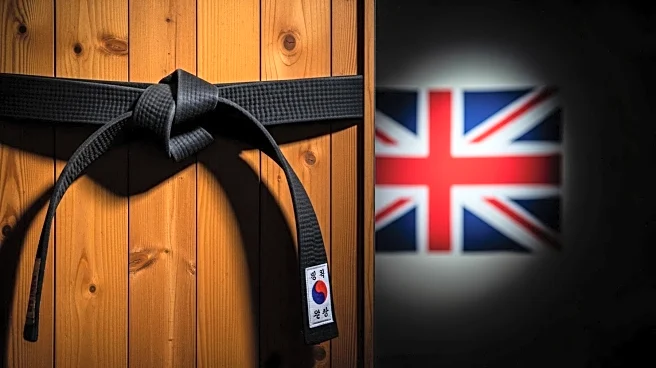What's Happening?
A South Korean man, aged 39, reportedly punched an 81-year-old British national outside a shopping center in Udon Thani province, Thailand, claiming self-defense. The incident occurred on September 7, when a security guard witnessed the altercation and called the police. The British man had arrived at the shopping center with his pet dog, which was not allowed inside, leading to a brief interaction with the guard. The South Korean man arrived shortly after in a taxi, and after a brief exchange, he punched the British man in the face. The South Korean man later told police that he felt threatened by the British man's proximity and actions, prompting him to act in self-defense. The British man received medical treatment and filed a complaint against the South Korean man, who faces charges of physical assault and carrying a weapon in public without permission.
Why It's Important?
This incident highlights the complexities of self-defense claims in international contexts, particularly involving expatriates. The legal proceedings could impact the South Korean man's residency and employment in Thailand, as he recently relocated to Udon Thani for work in website administration. The case also underscores the importance of understanding local laws and cultural norms, especially for foreigners living abroad. The charges against the South Korean man could lead to imprisonment or fines, affecting his personal and professional life. Additionally, the incident may influence local perceptions of foreign residents and their interactions with the community.
What's Next?
The South Korean man is facing legal proceedings under Thai law, with potential penalties including imprisonment and fines. The case will likely proceed through the Thai judicial system, where the man's self-defense claim will be evaluated. The outcome could set a precedent for similar cases involving foreign nationals in Thailand. Both parties may seek legal representation to navigate the complexities of the case. The incident may also prompt discussions on the safety and legal rights of expatriates in Thailand, potentially influencing future policy or community relations.
Beyond the Headlines
The incident raises questions about cultural misunderstandings and the challenges faced by expatriates in adapting to new environments. It highlights the need for effective communication and conflict resolution skills among foreign residents. The case may also lead to increased scrutiny of foreign nationals' behavior and interactions in Thailand, potentially affecting tourism and expatriate communities. Additionally, it could spark discussions on the adequacy of legal protections for foreigners and the role of cultural sensitivity in legal proceedings.









